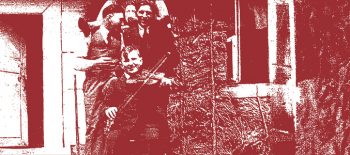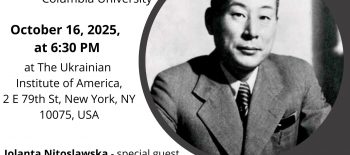presented by The Museum of Food and Drink &
The Polish Cultural Institute New York
Thursday, May 25, 2017
6:30pm – 8:00pm
MOFAD Lab: 62 Bayard Street, Brooklyn, NY 11222
Admission: $30 PURCHASE ONLINE
Did you know that the iconic Austin Nichols building in Williamsburg, next to the legendary Domino Sugar Factory, has a legacy that includes vodka, herbs, tango and love?
Austin-Nichols House, today a residential apartment building, was once home to a major American spirits distributor when the country was emerging from Prohibition. A young salesman saw an opportunity to introduce Polish vodkas nationwide – and unleash a legacy of heady aromatics and potent brews for the American public. Elizabeth Koszarski-Skrabonja tells the story of how her father’s pursuit of Zubrówka, Wisniówka and Wyborowa turned into a wartime drama in August 1939, and how he met the woman of his dreams at sea.
One of the early spirits included in the 1939 Vodka Contract was Zubrówka. Seasoned with a grass that grows only in the primordial Bialowieza Forest (and is the favorite meal of Polish bison), Zubrówka is not only the name of the town in The Grand Budapest Hotel it is a liquor with a 600 year legacy. Described by the author W. Somerset Maugham in The Razor’s Edge, “Zubrówka smells of freshly mown hay and spring flowers, of thyme and lavender and is so soft on the palate and so comfortable, it’s like listening to music by moonlight.”
Designed especially for this event at the Museum Of Food and Drink by Joel Lee Kulp – owner of local cocktail mainstays, The Richardson & Grand Ferry Tavern, The Kosciuszko Bridge is a new cocktail honoring a hero of two continents: Tadeusz Kosciuszko, who fought for liberty in Poland and America. This humanist, engineer, and designer of the fortifications at West Point deserves more than the re-dedication of his namesake bridge linking Queens and Brooklyn and a year-long celebration of his legacy by UNESCO: he deserves a good drink. In the spirit of liberty joining the spirits of two nations, The Kosciuszko Bridge is born in Brooklyn.
Polish bites from educator and chef Karolina Gumpert.
Live entertainment and pre-war Polish tango from Azuz Ensemble.
THE VODKA CONTRACT STORY is inspired by the history of a young entrepreneur, Kazimierz Koszarski, who worked for Austin Nichols and Co., Inc. in the 1930s as the manager of the department importing Polish vodkas, wines, and liquors.
Koszarski was born in the United States, but in childhood moved to his mother’s hometown of Sandomierz, Poland. He returned to the US at the age of 20. He spoke Polish and English fluently. He was a brave person, president of the Polish-American Bachelors’ Union and an active member of the Polish-American Chamber of Commerce. His idea for a business was to import Polish vodka to the United States on a large scale and in an orderly-prewar style. His scrupulously-maintained archive includes correspondence he conducted with vodka producers in Poland as well as art deco labels ordered for Polish vodka which was soon to flow freely into the United States: Wisniówka, Starka, Wyborowa, Zubrówka, Sliwowica…
He went on a business trip to Poland in August 1939. He was returning on the Batory, which left Gdynia on August 24 and called at Copenhagen before leaving there a day later. Many families were also on the Batory, sailing to New York for the World’s Fair. The Fair, which did not include a German pavilion because of the growing tension in Europe and around the world. Yet the Polish pavilion was decorated, for good reason, with a monument of the brave King Wladyslaw Jagiello, a symbol of Polish strength.
The ship’s passengers also included the daughter of the director of Gdynia-America Shipping Lines, Janina Orzechowska, whose father sent her, along with her mother, to the Fair in New York.
Koszarski boarded the ship with the contract of his life in his briefcase. Janina, now 96 years old, remembers a few days later at the Captains Ball, he requested the orchestra to play Mieczyslaw Fogg’s tango The One and Only The Batory’s traveling guests enjoyed themselves, drinking champagne. They included many wealthy Jewish couples heading for New York and leaving their children in the care of nannies. It was after the ball that the travelers were informed of the German invasion of Poland.
For a time, Koszarski’s contract became a piece of paper with great sentimental, but little monetary value…
Share this event on your social media.![]()
![]()
![]()
![]()



